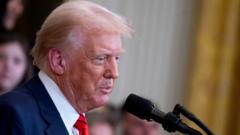The order is aimed at promoting what the administration calls "fairness" in athletics, but it faces backlash from human rights groups highlighting discrimination concerns.
**Trump's Executive Order Restricts Transgender Women in Sports Amid Controversy**

**Trump's Executive Order Restricts Transgender Women in Sports Amid Controversy**
Former President Trump establishes a contentious directive that bans transgender women from competing in women's sports categories.
In a decisive move reflecting ongoing debates around gender identity and athletics, former President Donald Trump has signed an executive order restricting transgender women from competing in female sports. This new directive, effective immediately, necessitates the Department of Education to investigate if high schools adhere to this order, reinforcing a growing trend among various sports organizations that have started to restrict transgender athletes.
Supporters of the decision, predominantly within Republican circles, argue that such measures are crucial for protecting women's sports and preserving competitive fairness. In contrast, LGBTQ+ advocacy groups and human rights organizations have condemned the order for its perceived discrimination and for potentially exposing transgender youth to undue harassment. The decision mainly impacts high school, university, and community sports settings, where many athletes begin their careers.
White House officials explained that the order is a shift from the Biden administration’s stance, which sought protections for LGBTQ+ students under existing federal laws. According to Trump's declaration, allowing transgender women to participate in women’s categories undermines the legitimacy of female athletes. He urged that investigations would be conducted against educational institutions failing to comply, threatening their federal funding.
In an effort to rally support, Trump announced that sporting governing bodies, such as the National Collegiate Athletics Association (NCAA), will be invited to engage in discussions with female athletes and their families, emphasizing their concerns. Additionally, he proposed measures to prevent transgender athletes from competing in major international events, specifically citing the upcoming 2028 Olympic Games in Los Angeles.
During a press announcement, Trump publicly declared, "the war on women's sports is over," further stating intentions to deny visas for transgender athletes intending to participate in the Olympics in the U.S. These comments have raised questions about their legality and ethical implications.
Human Rights Campaign president Kelley Robinson articulated opposition, saying that this order fosters an environment of discrimination, urging the focus to be on inclusion rather than policies that create barriers. According to statistics from the UCLA Williams Institute, less than 1% of individuals over 13 in the U.S. identify as transgender, with an even smaller percentage participating in sports, highlighting the narrow scope of those directly affected.
As the discourse unfolds, it remains to be seen how these policies will impact the landscape of competitive sports and the lives of transgender athletes in the U.S.
Supporters of the decision, predominantly within Republican circles, argue that such measures are crucial for protecting women's sports and preserving competitive fairness. In contrast, LGBTQ+ advocacy groups and human rights organizations have condemned the order for its perceived discrimination and for potentially exposing transgender youth to undue harassment. The decision mainly impacts high school, university, and community sports settings, where many athletes begin their careers.
White House officials explained that the order is a shift from the Biden administration’s stance, which sought protections for LGBTQ+ students under existing federal laws. According to Trump's declaration, allowing transgender women to participate in women’s categories undermines the legitimacy of female athletes. He urged that investigations would be conducted against educational institutions failing to comply, threatening their federal funding.
In an effort to rally support, Trump announced that sporting governing bodies, such as the National Collegiate Athletics Association (NCAA), will be invited to engage in discussions with female athletes and their families, emphasizing their concerns. Additionally, he proposed measures to prevent transgender athletes from competing in major international events, specifically citing the upcoming 2028 Olympic Games in Los Angeles.
During a press announcement, Trump publicly declared, "the war on women's sports is over," further stating intentions to deny visas for transgender athletes intending to participate in the Olympics in the U.S. These comments have raised questions about their legality and ethical implications.
Human Rights Campaign president Kelley Robinson articulated opposition, saying that this order fosters an environment of discrimination, urging the focus to be on inclusion rather than policies that create barriers. According to statistics from the UCLA Williams Institute, less than 1% of individuals over 13 in the U.S. identify as transgender, with an even smaller percentage participating in sports, highlighting the narrow scope of those directly affected.
As the discourse unfolds, it remains to be seen how these policies will impact the landscape of competitive sports and the lives of transgender athletes in the U.S.




















